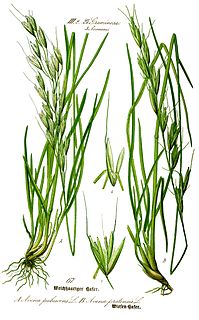This page is based on this
Wikipedia article Text is available under the
CC BY-SA 4.0 license; additional terms may apply.
Images, videos and audio are available under their respective licenses.

Flora is the plant life occurring in a particular region or time, generally the naturally occurring or indigenous—native plant life. The corresponding term for animal life is fauna. Flora, fauna and other forms of life such as fungi are collectively referred to as biota. Sometimes bacteria and fungi are also referred to as flora, as in the terms gut flora or skin flora.
Poverty grass is a common name for several plants and may refer to:

Danthonia intermedia is a species of grass known by the common names timber oatgrass, intermediate oatgrass, and mountain wild-oat grass. This clumping erect perennial grass is native to North America, where it is widespread across most of Canada and along the western United States into California. It is a plant of the plains as well as forested, mountainous, alpine environments.
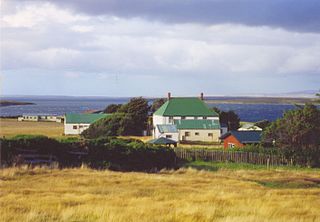
Tussock grasses or bunch grasses are a group of grass species in the Poaceae family. They usually grow as singular plants in clumps, tufts, hummocks, or bunches, rather than forming a sod or lawn, in meadows, grasslands, and prairies. As perennial plants, most species live more than one season. Tussock grasses are often found as forage in pastures and ornamental grasses in gardens.

Danthonia unispicata is a species of grass known by the common name onespike oatgrass, or onespike danthonia.

Trisetum is a genus of plants in the grass family, widespread in temperate, subarctic, and alpine habitats in much of the world. Oatgrass is a common name for plants in this genus.
D. californica may refer to:
D. intermedia may refer to:
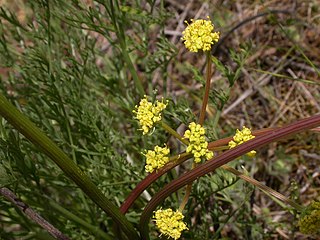
Lomatium cookii is a rare species of flowering plant in the carrot family known by the common names Cook's lomatium and agate desertparsley. It is endemic to Oregon in the United States, where it grows in only two valleys. It is a federally listed endangered species.

Perideridia erythrorhiza is a rare species of flowering plant in the carrot family known by the common names western yampah and redroot yampah. It is endemic to Oregon in the United States, where there are about 20 occurrences. The populations occur in three regions in southwestern Oregon which are separated by more than 50 miles. The three separate groups are located in the Klamath Mountains and on either side of the Cascade Range.
Danthonia compressa is a species of grass known by the common names mountain oatgrass, flattened oatgrass, and slender oatgrass.
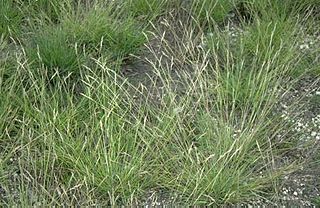
Danthonia spicata is a species of grass known by the common name poverty oatgrass, or simply poverty grass. It is native to North America, where it is widespread and common in many areas. The species is distributed across much of Canada and the United States, and its distribution extends into northern Mexico.
The Tennessee Valley is a small, undeveloped part of Marin County, near Mill Valley. Historically home to ranches and threatened with the development of a new city, the valley was incorporated into the Golden Gate National Recreation Area in 1972, with additional sections added to the park in 1974. The park contains horse stables, a native-plant nursery, and numerous trails for hiking, biking, and horse riding, including a 1.7-mile, handicap-accessible trail that leads to Tennessee Cove and its beach.
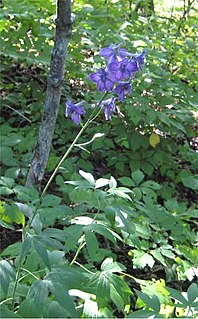
Delphinium exaltatum is a species of flowering plant in the buttercup family known by the common name tall larkspur. Other Delphinium species may be called tall larkspur, such as Delphinium barbeyi. D. exaltatum is native to the central and eastern United States, where it can be found in Kentucky, Maine, Ohio, Pennsylvania, Maryland, West Virginia, Virginia, North Carolina, Alabama, Tennessee, and Missouri.

Helictotrichon pubescens, downy oat-grass or downy alpine oatgrass, also known by its synonym Avenula pubescens, is a species of flowering plant in the Poaceae family. It is native to Europe and Asia. It can also be found in such US states as Connecticut, Delaware, Minnesota, New Jersey and Vermont, and in Canadian provinces such as Alberta, Manitoba, Ontario, Quebec, and Saskatchewan.
D. flavescens may refer to:
Tritimovirus is a genus of viruses, in the family Potyviridae. Plants serve as natural hosts. There are currently six species in this genus including the type species Wheat streak mosaic virus.

